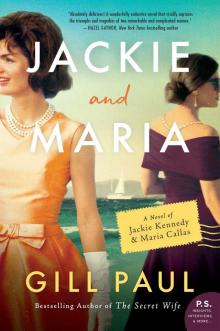Jackie and Maria Read online
Page 13
At her coming-out party, she had scrutinized the eligible candidates and decided that none was dynamic enough. Her long summers in France had featured plenty of flirtations and flings, with men who were exciting but not the marrying type. And then there had been John Husted, lovely John, to whom she had been engaged for a few heady months.
John was a handsome stockbroker with a romantic, poetic side. When she met him at a party, she’d just had her hair cut in the fashionable feather style, which gave her a gamine look.
“You look like a startled deer emerging from a wood and seeing its first ever human being,” he said. Those were his first words to her.
“I don’t know how to take that,” she replied. “Are you offering to protect me in the big, bad world?”
“It would be my pleasure.” He smiled and handed her a glass of champagne from the tray of a passing waiter. “Is that a good start?”
He fell in love with her right from the start—head over heels, utterly besotted—and she was swept up in the romance. When he got down on bended knee and asked her to marry him, when they had known each other less than a month, she was bowled over by his impetuosity and said yes straightaway.
Jackie shook her head, remembering her confidence in the face of the shocked reactions of her mother and friends. “When you find the right person, you just know,” she told them, with a twenty-two-year-old’s certainty.
Looking back, she could imagine what life with John would have been like. They would have lived on New York’s Upper West Side, where he had his stockbroker practice, and kept a summer home on Nantucket near his family’s estate. They would have been members of all the exclusive East Coast clubs and have dined out in New York’s top restaurants. There would have been staff, and she would have spent her days shopping and lunching with friends. She knew he wanted children, and she was pretty sure he would have been faithful.
It was meeting John’s mother that had shown her how much of a straitjacket that life might prove to be. The Husted matriarch seemed determined to slot her into a preformed, wife-shaped mold: she would have to look a certain way, run her household like a battleship, entertain John’s clients in fitting style, and produce exactly the right sort of children. His mother had been shocked that Jackie planned to work for the Washington Times-Herald; nice girls didn’t do dirty jobs like journalism.
Jackie knew she could have fought the matriarch and won. John was so much in love he would have let her do as she pleased, but that in itself put her off. She guessed she had wanted more of a challenge—and Jack Kennedy was certainly that.
A few weeks after her engagement to John, she called Jack at his office and asked if she could interview him for her column.
“I was wondering when you would get around to calling, Miss Bouvier,” he said with a grin, as his secretary showed her in. “But you didn’t need to make work an excuse.”
“Actually, work is the only reason,” she said, holding out her hand to show him her ring. “I’ve gotten engaged since we last saw each other.”
“Who’s the lucky fella?” he asked, and when she told him, he groaned: “Not a stockbroker! Anything but that. He’d be all wrong for you. Let’s go for a cocktail and I’ll explain to you exactly the type of man you need to marry.”
Jackie went for the cocktail but maintained that she was marrying John Husted and that was the end of it. Jack waged an intense campaign to change her mind, and it wasn’t long before he captured her heart. With John, she’d been like an Edith Wharton heroine, consumed by romance; now she realized that true love was bigger and sexier and far more dangerous. It was only a matter of weeks before she had returned her engagement ring to John and started dating Jack instead.
Jack Kennedy seldom brought her flowers or surprise gifts—and, if he did, she knew he was feeling guilty and had gotten his secretary to pick them out. He didn’t shower her with compliments or ask how her day had been. He didn’t often discuss his work with her, because he knew she wasn’t interested in the nitty-gritty of politics. But he asked her advice on the people around him, and she found that flattering.
Jackie had been a people watcher as far back as she could remember. She came across as reserved because she didn’t dominate conversation in a group but sat back and formed her own opinions, and she considered herself a good judge of character. When Jack brought a TV news reporter to dinner, a man named Bob Merryman, the liquor flowed and the jokes got lewd. Jackie watched Bob and saw a shrewdness in his eyes; he was pretending to be drunker than he really was and attempting to lull Jack into indiscretions.
“Don’t trust him,” she whispered behind her hand.
She was proved right the following day when Bob said, on air, that Jack Kennedy told “the bluest jokes” he had ever heard. That wasn’t the kind of image they wanted to cultivate. From then on, Jackie kept a keen eye on the circle Jack surrounded himself with.
She couldn’t imagine him winning the 1960 election. It would mean such an upheaval: a move to the White House, life in the public eye, severe curtailment of her personal freedom. Was she up to the role of First Lady? What if she let him down? Sometimes she secretly hoped he wouldn’t win—but of course she would never breathe a word of that.
He arrived in Hyannis Port on the Sunday after receiving the Democratic nomination, trailed by photographers and eager journalists with pens and notebooks poised.
“Where’s my favorite girl in the whole wide world?” he cried, swinging little Caroline high in the air but looking directly at Jackie. She loved those moments when they searched each other’s eyes and found understanding there. He looked tired, and she knew from his posture that his back was hurting.
“Mrs. Shaw,” she asked the nanny, “can you take Caroline down to the beach?” Caroline protested, but Jackie insisted: “There will be time to play with Daddy later. It’s grown-up time now.”
She took Jack’s arm and tugged on it. “Let’s go indoors.”
She led him to the living room and unfastened his tie, then knelt to untie his shoelaces.
“Thank God for home,” he sighed, lowering himself into an armchair. “I feel saner already. Any chance of a beer?”
She had already asked the maid to leave a chilled Budweiser on a side table, and she flipped the top and poured it into a glass, careful not to make too much foam. She liked knowing what he needed and doing it for him. It was a simple thing. The world would never see her behind-the-scenes supporting role, but she knew she was performing it to perfection.
Chapter 24
Milan
June 1960
Maria decorated a nursery at her home in Milan, choosing pale lemon for the walls, hedging her bets, although she was positive the baby was a girl. She bought heaps of toys: a wooden rocking horse with a thick wool mane and leather saddle; a Steiff teddy bear; a music box that played Swan Lake and had a revolving silver-skirted ballerina. She hired a nurse, who would come and live in the house straight after the birth and accompany them to the Christina later.
She and Ari discussed names, and he accepted her hunch that it was a girl.
“I would like a name from opera,” she said. “Perhaps Elvira or Isolde.”
“Didn’t they all commit suicide or have their hearts broken?” Ari asked. “Why not a classic Greek name, like Polyxeni or Vassiliki?”
“Vassiliki!” She laughed. “Do you want her to sound like a grandmother?”
“Okay,” he conceded. “Perhaps you should choose the name if it is a girl and I will choose for a boy. Do we have a deal?”
Maria was so sure it was a girl that she agreed.
Ari showed her how he shook hands on a business deal, squeezing firmly with his right hand and grasping his associate’s elbow with his left.
He had not yet told his children that they were to have a new sibling; he said he feared it would give Tina ammunition in the ongoing divorce negotiations. Maria squirmed when she imagined Tina’s reaction to their news.
The legal process
es were moving at a snail’s pace and it became apparent that they could not be married before the birth, but Maria decided it was only a minor setback. God would forgive them. By wearing her swing coat whenever she left the house, she had succeeded in keeping any hint of her pregnancy out of the press. When the news eventually leaked, as it surely would, she hoped the wedding date would have been set.
As the weeks passed, she marveled at the changes to her body. She had feared she might get fat again, but although her weight rose by twenty pounds, all of it was in her breasts and her belly. The doctor was pleased with her health. The only ill effect she suffered was low blood pressure, which caused occasional dizzy spells, but they passed after a rest and a light snack. She often sang to the baby, hoping to instill a love of music while it was in the womb. Both she and Ari noticed that the little one seemed to stop squirming when it heard her sing, as if it had paused to listen.
On the twenty-sixth of June, the day the baby was to be delivered, Maria traveled to the hospital with Bruna, clutching a bag that contained two of her nightgowns and some newborn-baby clothes, soft and fine as gossamer. Ari would remain at her house until after the Caesarean, then visit mother and child later. He had ordered Montecristo cigars, which he claimed were essential for a proud father—that and some bottles of Maria’s favorite vintage of Dom Pérignon.
Maria was nervous as she was prepped for the operation. She didn’t like the idea of being unconscious, or the knife that would slit open her belly, but it would all be worthwhile later in the day when she could kiss her child for the first time. She closed her eyes and breathed as instructed when the rubber mask was placed over her mouth and nose, aware of a sickly sweet scent as she went under.
WHEN MARIA OPENED her eyes, she was in bed, and Bruna was sitting beside her, fiddling with her rosary beads. She glanced at the window and saw the light outside fading. It must be early evening.
“Where’s the baby?” she asked, her voice husky.
Then she noticed that Bruna looked as if she had been crying, and felt a glimmer of fear.
“There’s a problem,” Bruna said, standing up. “Let me get the doctor.”
Maria pushed herself up on her elbows despite the tearing sensation in her belly. “What kind of problem?” she croaked, but Bruna was halfway out the door.
Was there something wrong with the baby? Why wasn’t it in the room? She lifted the sheet and saw a dressing on her abdomen. The operation had been carried out. She couldn’t feel much when she lay still, so perhaps the anesthetic was still numbing her.
Minutes later Ari came into the room, followed by the doctor, and she knew it was bad news when they couldn’t meet her eyes.
“Where is my baby?” she demanded. Ari came to sit beside her and took her hand, but still he wouldn’t look at her.
The doctor spoke slowly, as if reluctant to tell her. “The child—a boy—was delivered at four-thirty this afternoon.”
“A boy!” She registered this with surprise.
“But I’m afraid he failed to breathe. It seems the lungs were not developed. We tried to assist him but all our efforts failed and he died twenty minutes later.”
“What?” She turned to Ari and he nodded, gripping her hand so tightly she thought he would crush the bones.
Maria turned to the doctor again. “My child was alive this morning. I could feel him moving. How can he be dead now?”
“It seems there was a disorder affecting the lungs. We’re not sure what.”
She couldn’t take it in. How could her child have underdeveloped lungs, when hers were so powerful? She would have given the baby one of her own, were such a thing possible.
“Was it my fault?” she asked. She needed to know. “Was it because of my malformed uterus?”
The doctor shook his head. “Not at all. There’s nothing anyone could have done differently. It’s just nature’s way sometimes.”
She looked at Ari again. He was fighting back tears. “I’m so sorry,” she whispered. “I’ve let you down.”
He made a strangled noise in his throat and shook his head.
There was a ringing sound in Maria’s ears, and for a moment she thought this might be a nightmare. Maybe she was still under anesthesia and would awaken to find the baby was fine. Or maybe they had made a mistake, and when they checked again they would find he was breathing.
“Can I see him?” she asked.
They didn’t like that idea. The doctor frowned. “We don’t encourage it. You might find his appearance upsetting.”
“Of course I must see him. I insist!” She knew she would never believe this without seeing him with her own eyes. It was so sudden, so surreal.
The doctor asked a nurse to fetch him and she closed her eyes to pray. Dear God, please have mercy. Let my baby live. Please don’t take away the thing I wanted most in the world.
The nurse brought in a bundle swaddled in white muslin, and she unwrapped a little so Maria could see tufts of dark hair above a high forehead. Maria reached for him and snuggled the bundle close, finding him heavier than she’d expected. When she pulled back the muslin, there was his face, eyelids shut tight, plump cheeks, lips a little blue. She kissed his forehead and it wasn’t cold, but it wasn’t warm either.
Ari stood and walked to the window. He couldn’t look, but Maria wanted to see everything. She asked Bruna for her glasses, then unwrapped the muslin completely. Her baby was perfectly formed, with funny frog legs, a roll of fat around each thigh, miraculously tiny fingers and toes, a rounded belly with the sprout of cord still attached, dimples in his elbows, a chubby penis. Everything was perfect—everything, except his chest was not moving.
“I want a proper funeral,” she told Ari. “With an Orthodox priest. Can that be done even though he was not baptized?”
“I will arrange it,” he said, the first words he had uttered in a long time.
“What shall we call him? He is a boy so you must choose.”
“Omero,” he said straightaway. “After the author of the Odyssey.”
“Omero.” Maria nodded. She liked that name.
She tried to decide which of them he looked like. Was there a hint of Ari’s chin? At least he didn’t have her big nose. His skin was smooth and as downy as a peach. She kissed him again.
“Let me take him now,” the nurse said, reaching out.
Maria shoved her hand away. “Get off! You will not take him. You will not!”
She must have sounded fierce, because the nurse leapt backward.
Grief was beginning to swell within, wild and unfathomable, but she wouldn’t let it out, not yet. She wanted to spend time with her little boy and memorize every inch of him before they took him away forever.
THE DAY AFTER she was discharged from the hospital there was a funeral service, attended only by Maria, Ari, Bruna, and a priest. Afterward Maria’s legs gave way and she collapsed.
Most of the next days were spent in bed like an invalid, with Ari beside her, cradling her. He murmured words of love and comfort but she was too far away for him to reach. It wasn’t the same for him, couldn’t possibly be: he had children already; he hadn’t carried Omero inside him for nine months.
When the tears came, they were unstoppable. She couldn’t speak, couldn’t breathe, her entire being consumed by sobbing. Her chest hurt; her throat, nose, and eyes stung; and her heart ached with an intolerable pain.
Ari stroked her hair, kissed her tears, held her close. “We will try again,” he whispered. “We will have another child. I promise.”
“A baby was all I ever wanted,” she sobbed. “I didn’t want to sing. I didn’t want to be famous. I wanted a child. How could God be so cruel?”
“I will fix it,” he told her. “I promise.”
He wanted to feel in control, Maria thought. As if he had a say in this. But there were some things money couldn’t fix, and this was one.
Perhaps it was punishment for their sin of breaking up two marriages to be together. If so
, it was the harshest punishment imaginable. She felt broken in ways that she knew could never be fixed.
Chapter 25
Hyannis Port
November 8, 1960
Jackie was thirty-four weeks pregnant on Election Day when she went to the polls with Jack to cast her vote. He dropped her at their house, so distracted that he started to pull away while she still had one foot in the car.
“Hey! Stop!” she called, and he paused just long enough for her to catch her balance and slam the door behind her.
She ate lunch with Caroline, read her a story before her afternoon nap, then walked over to Bobby’s house, where a command communications center had been set up. Her lower back ached because some unidentified part of the baby—perhaps an elbow or a knee—was pressing against her spine. She could feel it moving lower into her pelvis. Jack teased that she walked like Caroline’s windup duck toy.
His campaign team was crammed into a bedroom at Bobby’s house: one person on the telephone, others huddled around the radio, yet more watching television news coverage, and they all stopped to discuss each report. The voices were low and serious, nerves etched on their faces. No one paid the slightest attention as Jackie wandered in, listening to disjointed snatches of conversation.
From what she could make out, they were worried about Virginia and Oklahoma, but resigned to losing the Electoral College votes in Florida. She knew they were confident of the African American vote in the southern states, especially since Jack had helped get Martin Luther King released from jail, but the big unknown was how much his Catholicism would count against him. Some Republicans had been spreading the rumor that Jack would have to take orders from the pope if he was elected, and there were bound to be voters who would believe that.
This election was also about which man the electorate trusted to stand up to the Soviets as they developed new long-range missiles. Their satellite, Sputnik, was already in orbit, and who knew what that might be used for? Jackie had been convinced when she watched the TV debate with Richard Nixon that her husband would emerge victorious, but the polls were neck and neck. Sitting president Eisenhower had been campaigning hard for Nixon during the past two weeks, and he remained popular at the end of his second term.

 The Collector's Daughter
The Collector's Daughter The Lost Daughter
The Lost Daughter Jackie and Maria
Jackie and Maria The Affair
The Affair Love...Maybe
Love...Maybe The Secret Wife
The Secret Wife No Place For a Lady
No Place For a Lady Another Woman’s Husband
Another Woman’s Husband World War I Love Stories
World War I Love Stories World War II Love Stories
World War II Love Stories